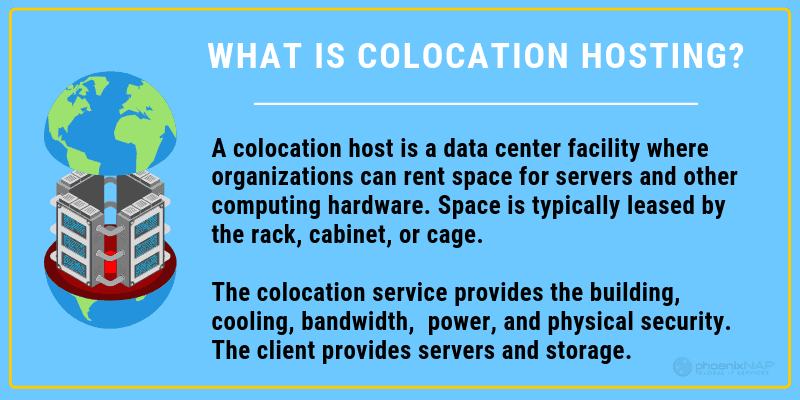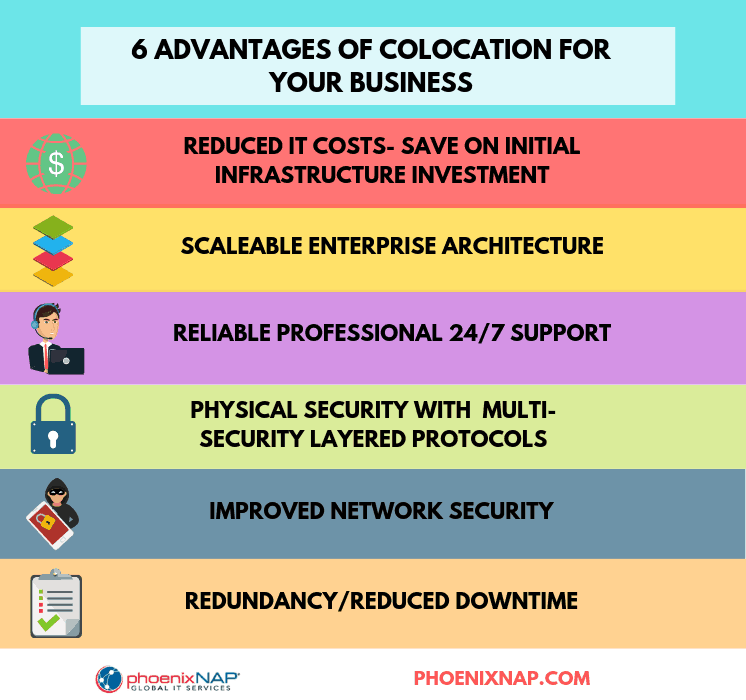What is Colocation Hosting? How Does it Work?
When your company is in the market for a web hosting solution, there are many options available.
Colocation is popular among businesses seeking benefits of a larger internal IT department without incurring the costs of a managed service provider.
What is Colocation Hosting?
Colocation hosting is a type of service a data center offers, in which it leases space and provides housing for servers. The clients own the servers and claim full authority over the hardware and software. However, the storage facility is responsible for maintaining a secure server environment.
Colocation services are not the same as cloud services. Colocation clients own hardware and lease space, with cloud services they do not have their hardware but lease it from the provider.
Colocation hosting should not be confused with managed (dedicated) services, as the second implies the data center also assumes management and maintenance control over the servers. With colocation hosting, the clients are the one who is responsible for supplying, maintaining, and managing their servers.

How does Server Colocation Hosting Work?
Maintaining and managing servers begins by ensuring the environment allows them to work at full capacity. However, this is the main problem businesses with “server closets” deal with. If companies are incapable of taking on such responsibilities on-premises, they will search for a data center that offers colocation services.
Colocation as a service works for businesses who already own hardware and software, but are unable to provide the conditions to store them. The clients, therefore, lease space from their service providers who offer housing for hardware, as well as environmental management.
Clients move their hardware to a data center, set up, and configure their servers. There is no physical contact between the provider and the clients’ hardware unless they specifically request additional assistance known as remote hands.
While the hardware is hosted, the data center assumes all responsibility for environmental management, such as cooling, a reliable power supply, on-premises security, and protection against natural disasters.
What is Provided by the Colocation Host?
The hosting company’s responsibilities typically include:
Security
The hosting company secures and authorizes access to the physical location. The security measures include installing equipment such as cameras, biometric locks, and identification for any personnel on site. Clients are responsible for securing their servers against cyber-attacks. The provider ensures no one without authorization can come close to the hardware.
Power
The data center is responsible for electricity and any other utilities required by the servers. This also includes energy backups, such as generators, in case of a power outage. Getting and using power efficiently is an essential component. Data centers can provide a power supply infrastructure that guarantees the highest uptime.
Cooling
Servers and network equipment generate a considerable amount of heat. Hosts provide advanced redundant cooling systems, so servers run optimally. Proper cooling can prevent damage and extends the life of your hardware.
Storage
A datacenter leases physical space for your servers. You can decide to store your hardware in any of the three options:
- Stand-alone cabinets: Each cabinet can house several servers in racks. Providers usually lease entire cabinets, and some may even offer partial cabinets.
- Cages: A cage is a separated, locked area in which server cabinets are stored. Cages physically isolate access to the equipment inside and can be built to house as many cabinets as the customer may need.
- Suites: These are secure, fully enclosed rooms in the colocation data center.
Disaster Recovery
The host needs to have a disaster recovery plan. It starts by building a data center away from disaster-prone areas. Also, this means reinforcing the site against disruption. For example, a host uses a backup generator in case of a power outage, or they might contract with two or more internet providers if one goes down.
Compliance
Healthcare facilities, financial services, and other businesses that deal with sensitive, confidential information need to adhere to specific compliance rules. They need unique configuration and infrastructure that are in line with official regulations.
Clients can manage setting up compliant servers. However, the environment in which they y are housed also needs to be compliant. Providing such settings is challenging and expensive. For this reason, customers turn to data centers. For example, a company that stores patients’ medical records requires a HIPAA compliant hosting provider.

Benefits of Colocation Hosting
Colocation hosting is an excellent solution for companies with existing servers. However, some clients are a better fit for colocation than others.
Reduced Costs
One of the main advantages of colocation hosting is reduced power and network costs. Building a high-end server environment is expensive and challenging. A colocation provider allows you to reap the benefits of such a facility without investing in all the equipment. Clients colocate servers to a secure, first-class infrastructure without spending money on creating one.
Additionally, colocation services allow customers to organize their finances with a predictable hosting bill. Reduced costs and consistent expenses contribute to stabilizing businesses and frees capital for other IT investments.
Expert Support
By moving servers to a data center, clients ensure full-time expert support. Colocation hosting providers specialize in the day-to-day operation of the facility, relieving your IT department from these duties. With power, cooling, security, and network hardware handled, your business can focus on hardware and software maintenance.
Scalability and Room to Grow
Colocation hosting also has the advantage of providing flexible resources that clients can scale according to their needs without having to make recurring capital investments. Allowing customers to expand to support their market growth is an essential feature if you want to develop into a successful, profitable business.
Availability 24/7/365
Customers turn to colo hosting because it assures their data is always available to them and their users. What they seek is consistent uptime, which is the time when the server is operational. Providers have emergency services and infrastructure redundancy that contribute to better uptime, as well as a service level agreement. The contract assures that if things are not working as required, customers are protected.
Although the servers may be physically inaccessible, clients have full control over them. Remote customers access and work on their hardware vie management software or with the assistance of remote hands. Using the remote hands service applies to delegate in-house technicians from the data center to assist in management and maintenance tasks. With their help, clients can avoid frequent journeys to the facility.
Clearly defined service level agreements (SLAs)
A colo service provider will have clear service level agreements. An SLA is an essential asset that you need to agree upon with your provider to identify which audits, processes, reporting, and resolution response times and definitions are included with the service. Trusted providers have flexible SLAs and are open to negotiating specific terms and conditions.

Additional Considerations of Colocating Your Hosting
Limited Physical Access
Clients who need frequent physical access to servers need to take into account the obligations that come with moving servers to an off-site location. Customers are allowed access to the facility if they live nearby or are willing to travel. Therefore, if they need frequent physical access, they should find a provider located nearby or near an airport.
Clients may consider a host in a region different from their home office. It is essential to consider travel fees as a factor.
Managing and Maintaining
Clients who need a managed server environment may not meet their needs just with colocation hosting. A colocation host only manages the data center. Any server configuration or maintenance is the client’s responsibility. If you need more hands-on service, consider managed services in addition to colocation. However, bear in mind that managed services come with additional costs.
High Cost for Small Businesses
Small businesses may not be big enough to benefit from colocation. Most hosts have a minimum amount of space clients need to lease. Therefore, a small business running one or two machines could spend more on hosting than they can save. Hardware-as-a-Service, virtual servers, or even outsourced IT might be a better solution for small businesses.
Is a Colocation Hosting Provider a Good Fit?
Colocation is an excellent solution for medium to large businesses without an existing server environment.
Leveraging the shared bandwidth of the colocation provider gives your business the capacity it needs without the costs of on-premises hosting. Colocation helps enterprises reduce the costs of power, bandwidth, and improve uptime through redundant infrastructure and security. With server colocation hosting, the client cooperates with the data center.
Now you can make the best choice for your business’s web hosting needs.